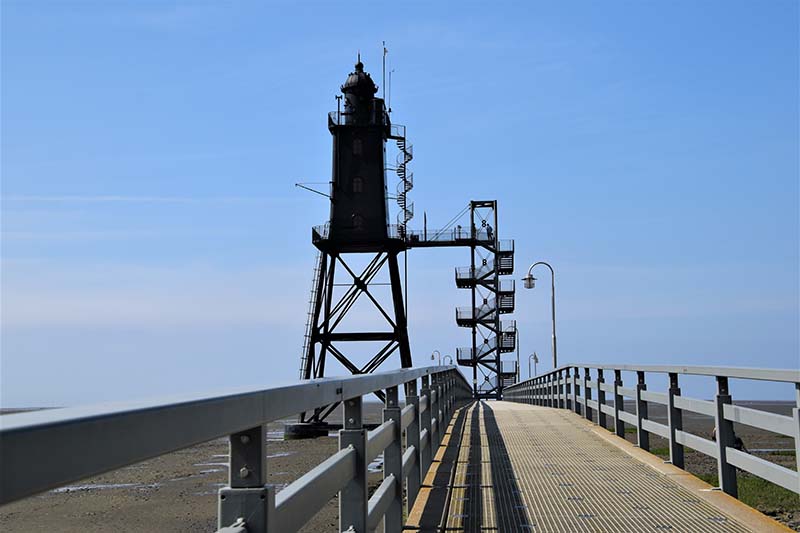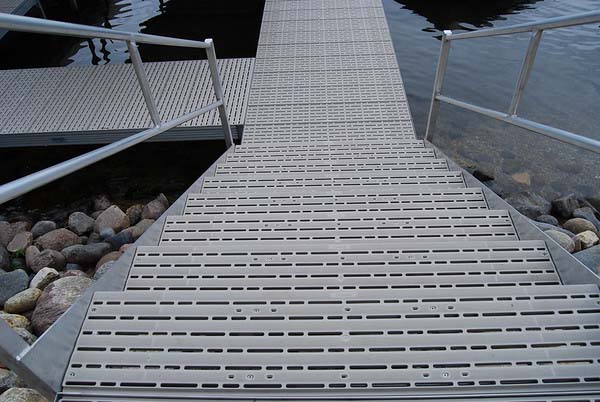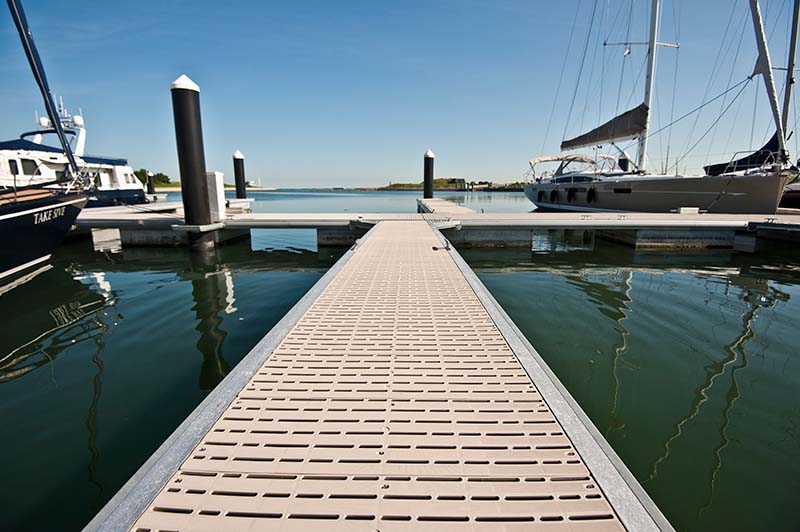Quality dock decking has to meet two fundamental requirements: it must survive the combined forces of wind and water, and it must look good while doing it. Every type of material used in marine decking has its strengths and weaknesses, and ultimately, it’s up to the eye of the water aficionado to decide which is the best marine decking to use. To help you make that decision, our experts at Titan Deck compiled this guide to quality dock decking in 2023.
Wood Decking
Usually, when you ask someone to picture a seaside dock, they’re going to think of an old wooden pier with gulls perched on top of the log posts and potentially barnacles clinging to the logs just at the waterline. Wooden decking has a timeless appeal as well as a low price tag. While there are long term maintenance costs, you won’t find a cheaper material—-in terms of initial costs—-for marine decking than wood.
Unfortunately, the benefit of wood’s low initial cost is counteracted by current material shortages of wood and its high labor costs.
In addition, the larger problem with wood is that it degrades quickly depending on the local climate and whether you’re in salt or freshwater. Wooden decking in areas like South Carolina or Florida might only last a few years before it needs to be replaced. The warm saltwater rots the wood if a hurricane doesn’t tear it apart. Even wooden decking on a cold freshwater lake in Minnesota will have to contend with the grinding forces of ice. So if you don’t mind continual upkeep, consider using wood for your marine decking.

Composite Decking
There is a way to still use wood for marine decking without necessarily having to worry about it degrading at an unacceptably fast rate. Composite wood is really a mixture of wood and another material, usually plastic. Composite wood decking is a popular and highly trusted alternative to wood. Not only is composite wood decking much more water resistant than plain old wood, but it also requires less maintenance to beautify and won’t fade as quickly under the sun’s UV radiation.
One drawback of composite decking is that the costs are higher. More processing goes into making composite wood than simply sawing up actual lumber, hence higher prices. Additionally, composite wood necessarily lacks the aesthetic appeal of real wood, although the time you’ll save from sanding the deck and picking splinters out of the soles of your feet might just make up for the artificial look of composite decking.
Capped Composite Decking
If you really want to go the extra mile with composite decking, consider using capped composite wood. Capped composite wood is the same as composite wood, except for the ‘capped’ part. That capping is actually an extremely durable polymer (plastic) outer shell. This dramatically reduces the chance that the actual organic wood in the composite decking can become rotten.
Metal Decking
A metal decking is a strong, modern, no-nonsense approach to building a marine dock. One of the most common metals used for marine decking for docks is aluminum. Easy to source, relatively cheap and lightweight, aluminum is a natural choice for anyone looking to use metal decking for their dock. Aluminum can withstand greater physical stresses than wood and will certainly hold up longer against the weather than wood.
As a general rule of thumb, all metals subject to water, saltwater especially, will corrode. However, aluminum corrodes quite differently than iron or steel. Whereas iron and steel will eventually rust away, aluminum will corrode to form an outer layer called aluminum oxide, which actually protects the uncorroded aluminum from further damage. Now, you still have to maintain aluminum and check for signs of structural damage, but generally, well-maintained aluminum decking can last decades or more.

PVC Decking
PVC is like composite wood only without the wood. With a 100% plastic content, you don’t have to worry about any rotting or insect damage, or damage caused by cleaning. You can pressure wash PVC decking without worrying about splintering or cracking.
Like aluminum, PVC is lightweight and easy to find. Installing PVC decking will go much faster than most other types of marine dock decking and once the PVC decking has reached the end of its service life the PVC can even be recycled!
The only drawback with PVC decking is the look. Though PVC can be made to mimic virtually any surface aesthetic, even the untrained eye can tell fake wood from real wood. If you’re just looking for a dock decking that works and you won’t have to worry about long term, PVC will meet most of your needs.
Polypropylene Decking
Polypropylene is a special type of plastic designed to be chemically resistant, flexible and cool underfoot. Polypropylene’s chemical resistance means it does not stain easily, so any dockside spills of gasoline or chum shouldn’t be an issue. Polypropylene’s flexible strength will be a pro during storm surges or high winds that might push other decking materials to their breaking point. Finally, polypropylene is known for staying cool under the sun, making polypropylene decking comfortable for barefoot mariners.
Polypropylene decking is modern decking through and through. It’s strong, easy to assemble and can weather the worst that wind and water can throw at it. With its exceptional resistance to UV radiation, polypropylene will go years longer than other decking materials without fading and its special molecular structure ensures that, though it will bend to the forces of nature, it will not break.

Polypropylene Decking with Titan Deck
Titan Deck products are some of the best polypropylene dock decking on the market. Titan Deck’s decking incorporates a grid-like structure with holes and slats in the deck which allow water and sunlight to pass through the decking. Not only does this ensure that your deck will meet most local regulations as to sunlight penetration, but it will also help your deck weather storm surges because the force of the weather will push through the deck and not against it.
Here at Titan Deck, our products come with a limited lifetime warranty, have UV protection to minimize fading and are designed to be the last marine decking you’ll ever need. Everything about Titan Deck is guided by the goal of longevity. For more information on various polypropylene plastic marine decking solutions, check out our offerings and contact our team for more information.

